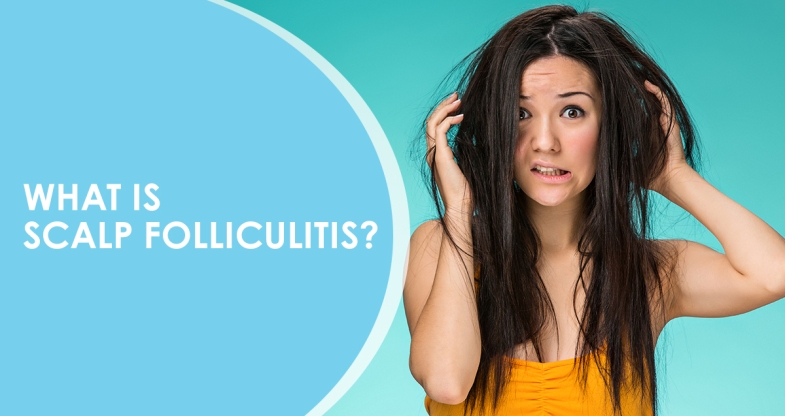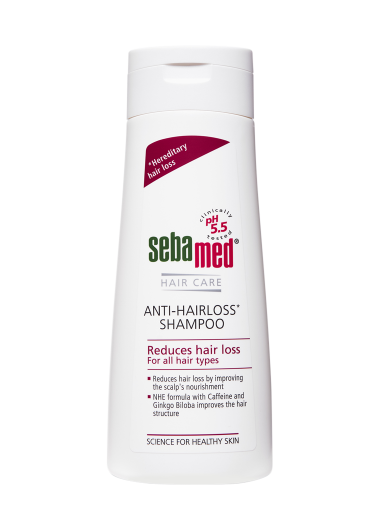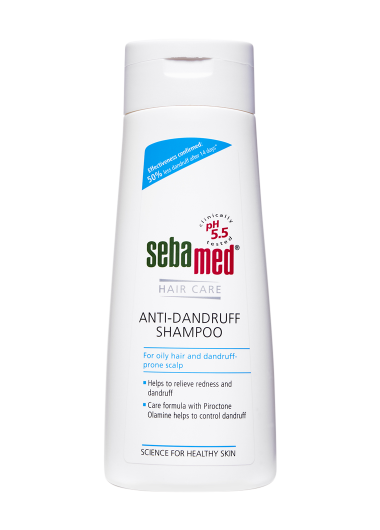What is Scalp Folliculitis
by Sebamed | Nov 21, 2023

Have you ever experienced an uncomfortable condition on your scalp causing sore, itchy, and inflamed patches? If so, you may have what’s known as scalp folliculitis. Scalp folliculitis is a common skin disorder caused by inflammation of the hair follicles that’s present on your head in the form of sores.
In its worst cases, those affected may experience rough patches or scarring on their scalp from this condition. Understanding how to treat scalp folliculitis properly is important for avoiding further discomfort and damage to your hair and skin health. Keep reading to learn more about recognizing and treating this condition effectively!
Index [hide]
Understanding Scalp Folliculitis
A common skin disorder called folliculitis is defined by the inflammation of the hair follicles, which is frequently brought on by bacterial infection. It first appears as little bumps around the base of each hair follicle that resemble pimples. This condition can be uncomfortable, itchy, and socially embarrassing, with the potential for infection to progress into the development of crusty sores.
Mild cases of folliculitis can typically resolve within a few days with simple self-care, leaving no lasting scars. However, more serious, or recurrent infections may require prescription medications.
Types of Scalp Folliculitis
Folliculitis presents various types, with superficial and deep categories based on the extent of follicular involvement. The following are different forms of folliculitis, with the most prevalent listed first:
-
Bacterial Folliculitis: This common form results in an itchy rash characterized by pus-filled bumps.
-
Hot Tub Rash (Pseudomonas Folliculitis): Marked by round, itchy bumps, this type can appear 1 to 2 days after exposure to bacteria that trigger it. Pseudomonas bacteria cause hot tub folliculitis, often found in improperly maintained hot tubs, water slides, and heated pools with incorrect chlorine and pH levels.
-
Razor Bumps (Pseudofolliculitis Barbae): Resembling folliculitis, this rash results from ingrown hairs, not infected follicles. It predominantly affects individuals with curly hair who shave too closely, typically seen on the face and neck. People who undergo bikini waxes may experience razor bumps in the groin area.
-
Pityrosporum Folliculitis: This type leads to an itchy rash characterized by pus-filled spots frequently found on the back and chest. A yeast infection causes it.
-
Gram-negative folliculitis: Characterized by pus-filled spots around the nose and mouth, this type can develop in individuals undergoing prolonged antibiotic therapy for acne.
-
Boils (Furuncles) and Carbuncles occur when staph bacteria deeply infect hair follicles. Boils manifest as sudden, painful, inflamed bumps, while carbuncles are clusters of spots.
-
Sycosis Barbae: Affecting individuals who shave, this type is associated with facial hair grooming practices.

Tips To Deal with Scalp Folliculitis
Dealing with scalp folliculitis can be uncomfortable, but you can implement several tips and strategies to manage and alleviate the condition. Here are some tips to help you address scalp folliculitis:
Maintain Good Hygiene:
Gently wash your hair and scalp daily with a mild, pH-balanced shampoo. Avoid using harsh, fragranced, or medicated shampoos unless a dermatologist recommends. Sebamed Anti-hair loss Shampoo relieves scalp tension. The formula offers relief from scalp tension and discomfort, contributing to a more comfortable and relaxed sensation.

Gives a smooth, silky texture and helps in repairing cuticles and follicles, thus controlling hair fall: By repairing hair cuticles and follicles, this shampoo can help control hair fall and make your hair feel smooth and silky. It effectively eliminates scalp itchiness, providing relief and comfort.
For those with damaged or distressed hair, this shampoo can help in their recovery, making hair appear healthier and smoother. Hair elasticity is essential for strong, flexible hair strands. This shampoo helps in restoring this important property. Sebamed Anti-Hair Loss Shampoo enhances the shine and luster of your hair, leaving it looking more attractive and healthier.
Use Anti-fungal Shampoos:
If your scalp folliculitis is caused by a fungal infection, using anti-fungal shampoos containing ingredients like ketoconazole, selenium sulfide, Piroctone Olamine or pyrithione zinc may be helpful. Follow the instructions on the product label. The Sebamed Anti Dandruff Shampoo is a dermatologist-formulated, soap-free cleansing shampoo.
It features a mild, yet effective active cleansing compound designed to clean your hair gently without causing any itchiness or irritation to the scalp.

Avoid Irritants:

The Sebamed Everyday Shampoo, created by dermatologists, is a soap-free shampoo that provides mild scalp, repair scalp barrier and hair cleansing. Those particularly favor it with sensitive scalps.
This shampoo is completely free of soap and alkali, ensuring it cleanses your hair and moisturizes your scalp. By aiding moisture retention on your scalp, the Everyday Shampoo combats issues like dandruff and itchiness, often associated with conditions such as psoriasis. Moreover, Sebamed Everyday Shampoo lacks potential irritants like Parabens, Paraffin, Propylene Glycol, and Phthalates, making it highly suitable for even the most sensitive scalps.
Warm Compresses:
Applying a warm, damp cloth or compress to the affected areas for 15-20 minutes can help soothe itching and discomfort.
Avoid Tight Hairstyles:
Tight hairstyles like braids or ponytails can exacerbate scalp folliculitis. Opt for looser hairstyles that do not place excessive pressure on the scalp.
Hair and Scalp Health:
Maintain overall hair and scalp health. Avoid excessive heat styling, overwashing, and overusing hair products.
Diet and Lifestyle:
A balanced and healthy lifestyle can support overall skin health. Eating nutrient-rich foods and staying hydrated can promote healing.
Consult a Dermatologist:
If your scalp folliculitis persists and worsens, or you experience pain, discharge, or hair loss, consult a dermatologist. They can provide a precise diagnosis and recommend appropriate treatment options.
The Significance of pH 5.5 for Scalp Health
Maintaining a balanced pH level is crucial for the skin and plays a significant role in ensuring a healthy scalp. Here’s why pH 5.5 is essential for scalp health:
Natural Acidic Environment:
-
The scalp, like the skin, benefits from a slightly acidic environment.
-
A pH level 5.5 supports the scalp’s natural acid mantle, providing a protective barrier against external factors.
Sebum Regulation:
-
The sebaceous glands on the scalp produce sebum, an oily substance that moisturizes the hair and scalp.
-
A pH level 5.5 helps regulate sebum production, preventing the scalp from becoming too oily or dry.
Maintaining Microbial Balance:
-
Much like the skin, the scalp has a microbiome consisting of beneficial microorganisms.
-
A pH of 5.5 supports the growth of good bacteria while discouraging the growth of harmful microbes, promoting a healthy balance.
Preventing Dryness and Irritation:
-
An optimal pH level helps prevent the scalp from becoming excessively dry or irritated.
-
Dry scalp can lead to issues such as dandruff and itchiness, especially in winter when the air tends to be drier.
Sebamed Anti Dandruff Shampoo is the best antibacterial shampoo for hair cleansing and scalp barrier. You must include this shampoo in your daily routine.
Wrapping Up!
All in all, scalp folliculitis is a common skin condition that can cause discomfort and distress. It’s important to address any inflamed follicles quickly as well as consider the use of an anti-fungal shampoo. For individuals with a heightened risk of fungal scalp infections, it is beneficial to determine underlying triggers like lifestyle choices or the use of certain products and make necessary lifestyle changes or product switches.
Walnut oil has anti-inflammatory properties that have proven helpful for some suffering from scalp folliculitis, along with other natural remedies, including tea tree oil, coconut oil, and apple cider vinegar.
Further, Sebamed hair care products with pH 5.5 also reduce the risk of fungal infection on the scalp by targeting bacteria and fungi, preventing their growth. Consider incorporating these into your daily hair care routine to keep your scalp healthy, strong, and free!
Products Mentioned in the Blog
- Sebamed Anti-hair loss Shampoo
- Sebamed Everyday Shampoo
- Sebamed Anti Dandruff Shampoo
- Sebamed hair care products
FAQs
-
Can I prevent scalp folliculitis?
Preventing scalp folliculitis involves keeping the scalp clean and avoiding practices introducing bacteria to hair follicles, such as sharing hair accessories or using unclean hair care tools. Using a mild, pH-balanced shampoo and avoiding excessive hair product use can also help prevent it.
-
When should I seek medical advice for scalp folliculitis?
If the condition worsens, becomes painful, leads to hair loss, or doesn't improve with home care, consult a healthcare professional for proper diagnosis and treatment.







